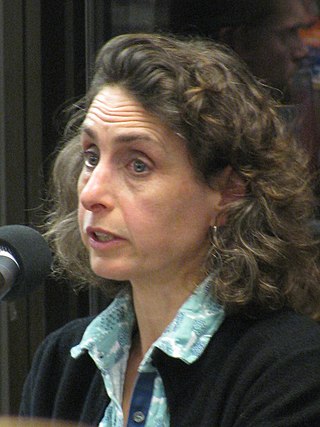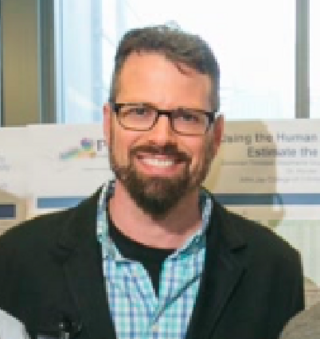
Sherry Turkle is an American sociologist. She is the Abby Rockefeller Mauzé Professor of the Social Studies of Science and Technology at the Massachusetts Institute of Technology. She obtained a BA in social studies and later a PhD in sociology and personality psychology at Harvard University. She now focuses her research on psychoanalysis and human-technology interaction. She has written several books focusing on the psychology of human relationships with technology, especially in the realm of how people relate to computational objects. Her memoir 'Empathy Diaries' received excellent critical reviews.

Silent Spring is an environmental science book by Rachel Carson. Published on September 27, 1962, the book documented the environmental harm caused by the indiscriminate use of DDT, a pesticide used by soldiers during WW2. Carson accused the chemical industry of spreading disinformation, and public officials of accepting the industry's marketing claims unquestioningly.

Hanabiko, nicknamed "Koko" was a female western lowland gorilla. Koko was born in San Francisco Zoo, and lived most of her life at The Gorilla Foundation's preserve in the Santa Cruz Mountains. The name "Hanabiko" (花火子), lit. 'fireworks child', is of Japanese origin and is a reference to her date of birth, the Fourth of July. Koko gained public attention upon a report of her having adopted a kitten as a pet and naming him "All Ball", which the public perceived as her ability to rhyme.

Mary Temple Grandin is an American academic and animal behaviorist. She is a prominent proponent of the humane treatment of livestock for slaughter and the author of more than 60 scientific papers on animal behavior. Grandin is a consultant to the livestock industry, where she offers advice on animal behavior, and is also an autism spokesperson.

Donna J. Haraway is an American professor emerita in the history of consciousness and feminist studies departments at the University of California, Santa Cruz, and a prominent scholar in the field of science and technology studies. She has also contributed to the intersection of information technology and feminist theory, and is a leading scholar in contemporary ecofeminism. Her work criticizes anthropocentrism, emphasizes the self-organizing powers of nonhuman processes, and explores dissonant relations between those processes and cultural practices, rethinking sources of ethics.

Mariel Hemingway is an American actress. She began acting at age 14 with a Golden Globe-nominated breakout role in Lipstick (1976), and she received Academy and BAFTA Award nominations for her performance in Woody Allen's Manhattan (1979).

Michael Kevin Pollan is an American journalist who is a professor and the first Lewis K. Chan Arts Lecturer at Harvard University. Concurrently, he is the Knight Professor of Science and Environmental Journalism and the director of the Knight Program in Science and Environmental Journalism at the UC Berkeley Graduate School of Journalism where in 2020 he cofounded the UC Berkeley Center for the Science of Psychedelics, in which he leads the public-education program. Pollan is best known for his books that explore the socio-cultural impacts of food, such as The Botany of Desire and The Omnivore's Dilemma.

Mary Roach is an American author specializing in popular science and humor. She has published seven New York Times bestsellers: Stiff: The Curious Lives of Human Cadavers (2003), Spook: Science Tackles the Afterlife (2005), Bonk: The Curious Coupling of Science and Sex (2008), Packing for Mars: The Curious Science of Life in the Void (2010), Gulp: Adventures on the Alimentary Canal (2013), Grunt: The Curious Science of Humans at War (2016), and Fuzz: When Nature Breaks the Law (2021).

Rebecca L. Skloot is an American science writer who specializes in science and medicine. Her first book, The Immortal Life of Henrietta Lacks (2010), was one of the best-selling new books of 2010, staying on The New York Times Bestseller list for over 6 years and eventually reaching #1. It was adapted into a movie by George C. Wolfe, which premiered on HBO on April 22, 2017, and starred Rose Byrne as Skloot, and Oprah Winfrey as Lacks's daughter Deborah.

Breaking the Spell: Religion as a Natural Phenomenon is a 2006 book by American philosopher and cognitive scientist Daniel Dennett, in which the author argues that religion is in need of scientific analysis so that its nature and future may be better understood. The "spell" that requires "breaking" is not religious belief itself but the belief that it is off-limits to or beyond scientific inquiry.
Deborah Cadbury is a British author, historian and television producer with the BBC. She has won many international awards for her documentaries including an Emmy Award.

Elizabeth Kolbert is an American journalist, author, and visiting fellow at Williams College.

Mary-Claire King is an American geneticist. She was the first to show that breast cancer can be inherited due to mutations in the gene she called BRCA1. She studies human genetics and is particularly interested in genetic heterogeneity and complex traits. She studies the interaction of genetics and environmental influences and their effects on human conditions such as breast and ovarian cancer, inherited deafness, schizophrenia, HIV, systemic lupus erythematosus and rheumatoid arthritis. She has been the American Cancer Society Professor of the Department of Genome Sciences and of Medical Genetics in the Department of Medicine at the University of Washington since 1995.
Dorothy Wolfers Nelkin was an American sociologist of science most noted for her work researching and chronicling interplay between science, technology and the general public. Her work often highlighted the ramifications of unchecked scientific advances and potential threats to privacy and civil liberties. She was the author or co-author of 26 books, including Selling Science: How the Press Covers Science and Technology, The Molecular Gaze: Art in the Genetic Age, and Body Bazaar: The Market for Human Tissue in the Biotechnology Age.

Florence Leontine Mary Welch is an English singer and songwriter. She is the lead vocalist and primary songwriter of the indie rock band Florence and the Machine. The band's debut studio album, Lungs (2009), topped the UK Albums Chart and won the Brit Award for Best British Album. Their next four albums also achieved chart success. In 2018, Welch released a book titled Useless Magic, a collection of lyrics and poems written by her, along with illustrations.
Michelle Nijhuis is an American science journalist who writes about conservation and climate change for many publications, including National Geographic and Smithsonian magazines.

Claire Dederer is an American writer who regularly contributes essays, reviews and criticism to publications including The New York Times. She has written three books, Love and Trouble, Poser: My Life in Twenty-Three Yoga Poses, and Monsters.
Wendy M. Williams is a psychologist and professor known for her research in the fields of intelligence with regards to training and development. Williams is a professor at Cornell University in their Department of Human Development. Williams is also the founder of the Cornell Institute for Women in Science (CIWS), a center with the intended purpose for studying and promoting women in science. Working alongside the National Science Foundation, Williams leads the "Thinking Like a Scientist" program, which intends to diversify the science community by getting girls and other underrepresented groups interested.

Nathan H. Lents is an American scientist, author, and university professor. He has been on the faculty of John Jay College since 2006 and is currently the director of the Cell and Molecular Biology program and the former head of the honors program and the campus Macaulay Honors College program. Lents is noted for his work in cell biology, genetics, and forensic science, as well as his popular science writing and blogging on the evolution of human biology and behavior. Lents is also a visiting faculty member at the University of Lincoln in the UK and a fellow with the Committee for Skeptical Inquiry.

Canan Dağdeviren is a Turkish academic, physicist, material scientist, and Associate Professor at the Massachusetts Institute of Technology (MIT), where she currently holds the LG Career Development Professorship in Media Arts and Sciences. Dagdeviren is the first Turkish scientist in the history of the Harvard Society to become a Junior Fellow in the Society of Fellows at Harvard University. As a faculty member, she directs her own Conformable Decoders research group at the MIT Media Lab. The group works at the intersection of materials science, engineering and biomedical engineering. They create mechanically adaptive electromechanical systems that can intimately integrate with the target object of interest for sensing, actuation, and energy harvesting, among other applications. Dagdeviren believes that vital information from nature and the human body is "coded" in various forms of physical patterns. Her research focuses on the creation of conformable decoders that can "decode" these patterns into beneficial signals and/or energy.
















